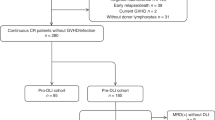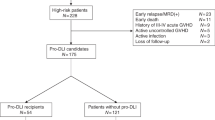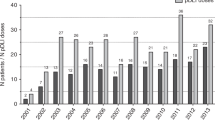Abstract
Prophylactic donor lymphocyte infusion (pDLI) is a potential intervention to prolong remission for patients receiving allogeneic hematopoietic stem cell transplantation (allo-SCT), however, the optimal timing and dose are unknown. We conducted a prospective trial exploring the feasibility of early withdrawal of immunosuppression (WOI) at day 60 followed by dose escalation of pDLI after alemtuzumab-based, T-cell depleted conditioning for patients with high-risk hematologic malignancies. pDLI were administered at day 75 to day 90 and again in 4–8 week intervals with receipt of up to 5 pDLI infusions. Fourty-six patients with matched-related donors (MRD) and 29 patients with matched-unrelated donors (MUD) were considered. Twenty-eight MRD patients were able to undergo WOI, 26 patients (93%) received at least 1 DLI, 16 patients (57%) received 3+, and 7 patients (25%) received 5 pDLI. Only 7 MUD patients were able to undergo WOI, 4 (57%) received at least 1 pDLI, 1 patient (14%) received 3 DLI, and no patients received all 5. Median PFS for patients on the study was 366 days. The estimated 2-year PFS and OS rates for all patients were 41% (95% CI, 32–54%) and 51% (95% CI, 41–63%) compared with 57% (95% CI, 41–77%) and 67% (95% CI, 52–86%) for patients who received at least one pDLI. In addition, MRD patients receiving pDLI had faster immune re-constitution and improved donor chimerism. Our trial proposes a novel dosage and treatment schedule for pDLI that is tolerable for patients who have received MRD allo-SCT and leads to improved outcomes.
This is a preview of subscription content, access via your institution
Access options
Subscribe to this journal
Receive 12 print issues and online access
$259.00 per year
only $21.58 per issue
Buy this article
- Purchase on Springer Link
- Instant access to full article PDF
Prices may be subject to local taxes which are calculated during checkout



Similar content being viewed by others
References
Fan Y, Artz AS, van Besien K, Stock W, Larson RA, Odenike O, et al. Outcomes following second allogeneic stem cell transplant for disease relapse after T cell depleted transplant correlate with remission status and remission duration after the first transplant. Exp Hematol Oncol. 2019;8. https://ehoonline.biomedcentral.com/articles/10.1186/s40164-018-0125-6.
Dominietto A, Pozzi S, Miglino M, Albarracin F, Piaggio G, Bertolotti F, et al. Donor lymphocyte infusions for the treatment of minimal residual disease in acute leukemia. Blood. 2007;109:5063–4.
Krishnamurthy P, Potter VT, Barber LD, Kulasekararaj AG, Lim ZY, Pearce RM, et al. Outcome of donor lymphocyte infusion after T cell–depleted allogeneic hematopoietic stem cell transplantation for acute myelogenous leukemia and myelodysplastic syndromes. Biol Blood Marrow Transpl. 2013;19:562–8.
Bejanyan N, Weisdorf DJ, Logan BR, Wang H-L, Devine SM, de Lima M, et al. Survival of patients with acute myeloid leukemia relapsing after allogeneic hematopoietic cell transplantation: a center for international blood and marrow transplant research study. Biol Blood Marrow Transpl. 2015;21:454–9.
Yan C-H, Liu Q-F, Wu D-P, Zhang X, Xu L-P, Zhang X-H, et al. Prophylactic donor lymphocyte infusion (DLI) followed by minimal residual disease and graft-versus-host disease-guided multiple DLIs could improve outcomes after allogeneic hematopoietic stem cell transplantation in patients with refractory/relapsed acute leukemia. Biol Blood Marrow Transpl. 2017;23:1311–9.
Schmid C, Labopin M, Schaap N, Veelken H, Schleuning M, Stadler M, et al. Prophylactic donor lymphocyte infusion after allogeneic stem cell transplantation in acute leukaemia—a matched pair analysis by the Acute Leukaemia Working Party of EBMT. Br J Haematol. 2019;184:782–7.
Wang Y, Liu D-H, Fan Z-P, Sun J, Wu X-J, Ma X, et al. Prevention of relapse using DLI can increase survival following HLA-identical transplantation in patients with advanced-stage acute leukemia: a multi-center study. Clin Transpl. 2012;26:635–43.
Eefting M, Halkes CJM, de Wreede LC, van Pelt CM, Kersting S, Marijt EWA, et al. Myeloablative T cell-depleted alloSCT with early sequential prophylactic donor lymphocyte infusion is an efficient and safe post-remission treatment for adult all. Bone Marrow Transpl. 2014;49:287–91.
Xuan L, Fan Z, Zhang Y, Zhou H, Huang F, Dai M, et al. Sequential intensified conditioning followed by prophylactic DLI could reduce relapse of refractory acute leukemia after allo-HSCT. Oncotarget. 2016;7. http://www.oncotarget.com/fulltext/8691.
de Lima M, Bonamino M, Vasconcelos Z, Colares M, Diamond H, Zalcberg I, et al. Prophylactic donor lymphocyte infusions after moderately ablative chemotherapy and stem cell transplantation for hematological malignancies: high remission rate among poor prognosis patients at the expense of graft-versus-host disease. Bone Marrow Transpl. 2001;27:73–8.
Liga M, Triantafyllou E, Tiniakou M, Lambropoulou P, Karakantza M, Zoumbos NC, et al. High alloreactivity of low-dose prophylactic donor lymphocyte infusion in patients with acute leukemia undergoing allogeneic hematopoietic cell transplantation with an alemtuzumab-containing conditioning regimen. Biol Blood Marrow Transpl. 2013;19:75–81.
Montero A, Savani BN, Shenoy A, Read EJ, Carter CS, Leitman SF, et al. T-cell depleted peripheral blood stem cell allotransplantation with T-cell add-back for patients with hematological malignancies: effect of chronic GVHD on outcome. Biol Blood Marrow Transpl. 2006;12:1318–25.
Soiffer RJ, Alyea EP, Hochberg E, Wu C, Canning C, Parikh B. et al. Randomized trial of CD8+ T-cell depletion in the prevention of graft-versus-host disease associated with donor lymphocyte infusion. Biol Blood Marrow Transpl. 2002;8:625–32.
Jedlickova Z, Schmid C, Koenecke C, Hertenstein B, Baurmann H, Schwerdtfeger R, et al. Long-term results of adjuvant donor lymphocyte transfusion in AML after allogeneic stem cell transplantation. Bone Marrow Transpl. 2016;51:663–7.
Armand P, Kim HT, Logan BR, Wang Z, Alyea EP, Kalaycio ME, et al. Validation and refinement of the disease risk index for allogeneic stem cell transplantation. Blood. 2014;123:3664–71.
Liu H, Zha Y, Choudhury N, Malnassy G, Fulton N, Green M, et al. WT1 peptide vaccine in Montanide in contrast to poly ICLC, is able to induce WT1-specific immune response with TCR clonal enrichment in myeloid leukemia. Exp Hematol Oncol. 2018;7. https://ehoonline.biomedcentral.com/articles/10.1186/s40164-018-0093-x.
Inoue H, Park J-H, Kiyotani K, Zewde M, Miyashita A, Jinnin M. et al. Intratumoral expression levels of PD-L1, GZMA, and HLA-A along with oligoclonal T-cell expansion associate with response to nivolumab in metastatic melanoma. OncoImmunology. 2016;5:e1204507.
Acknowledgements
HL was supported by UCCCC pilot grant, Cancer Research Foundation Young investigator award and K12 Paul Calabresi award. The work is also supported by University of Chicago Cancer Center Support Grant (CA014599).
Author information
Authors and Affiliations
Contributions
HL and AA designed the trial. HL, AA WS, RAL, OO, JK, JL, SK, PR, and MB conducted the clinical trial, collected and analyzed the clinic data. NF collected and prepared patient samples and performed WT1 qRT-PCR. JP and YN contributed to TCR sequencing. SL conducted the statistical analysis of the clinical results. All authors contributed to the data analysis and wrote the manuscript. All authors read and approved the final manuscript.
Corresponding author
Ethics declarations
Conflict of interest
While several co-authors had research support from pharmaceutical companies, or served as consultant or advisory board members for pharmaceutical companies, none has a conflict of interest associated with this current study.
Additional information
Publisher’s note Springer Nature remains neutral with regard to jurisdictional claims in published maps and institutional affiliations.
Rights and permissions
About this article
Cite this article
Kothari, S., Artz, A.S., Lee, S.M. et al. Dose escalation prophylactic donor lymphocyte infusion after T-cell depleted matched related donor allogeneic hematopoietic cell transplantation is feasible and results in higher donor chimerism, faster immune re-constitution, and prolonged progression-free survival. Bone Marrow Transplant 55, 1161–1168 (2020). https://doi.org/10.1038/s41409-020-0798-4
Received:
Revised:
Accepted:
Published:
Issue Date:
DOI: https://doi.org/10.1038/s41409-020-0798-4
This article is cited by
-
A novel risk model for predicting early relapse in acute myeloid leukemia patients undergoing allogeneic hematopoietic stem-cell transplantation
Bone Marrow Transplantation (2023)
-
Maintenance sorafenib is superior to prophylactic donor lymphocyte infusion at improving the prognosis of acute myeloid leukemia with FMS-like tyrosine kinase 3 internal tandem duplication after allogeneic hematopoietic stem cell transplantation
Bone Marrow Transplantation (2021)
-
Challenges for cancer patients returning home during SARS-COV-19 pandemic after medical tourism - a consensus report by the emirates oncology task force
BMC Cancer (2020)



